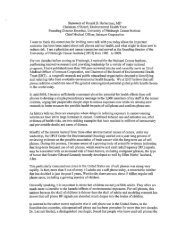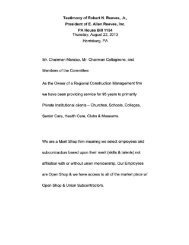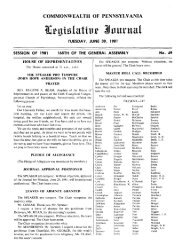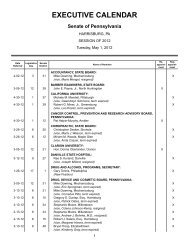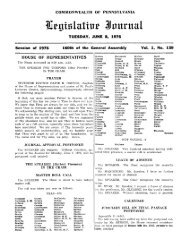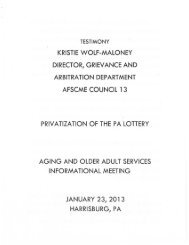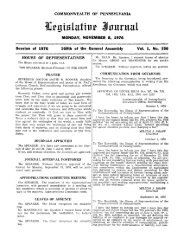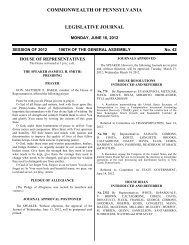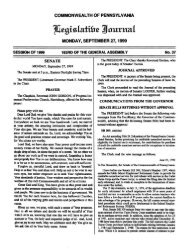commonwealth of pennsyl,vania - The Pennsylvania General ...
commonwealth of pennsyl,vania - The Pennsylvania General ...
commonwealth of pennsyl,vania - The Pennsylvania General ...
Create successful ePaper yourself
Turn your PDF publications into a flip-book with our unique Google optimized e-Paper software.
2828 LEGISLATIVE JOURNAL-HOUSE September 13,<br />
Mr. WONNELL. Only todockets.<br />
Mr. BERSON. To dockets and compilations kept in the nor-<br />
ma1 course <strong>of</strong> business. <strong>The</strong>y would not have access that they<br />
have today. <strong>The</strong>y do not have access today to the central state<br />
police repository <strong>of</strong> criminal justice records and they do not<br />
have it under this bill.<br />
Mr. O'DONNELL. Is there not a distinction between criminal<br />
history record information and docket information?<br />
Mr. BERSON. Yes, there is.<br />
Mr. O'DONNELL. Under this bill the public would not have<br />
access to criminal history record information. Is that correct?<br />
Mr. BERSON. That is correct.<br />
Mr. O'DONNE1,L. Rut reporters would, under that amend-<br />
ment?<br />
Mr. BERSON. As I read the Miller amendment, yes.<br />
Mr. O'DONNELL. So the posture <strong>of</strong> this hill now to be passed<br />
by the House would be that the public would not have access<br />
but that private employers, with permission, would, and re-<br />
porters would?<br />
Mr. BERSON. If I read the Miller amendment, it would give<br />
the working press accessM the centralrepository.<br />
Mr. O'DONNELL. Let me give you two hypotheticals which I<br />
would like to respond to in terms <strong>of</strong> this bill: My secretary, as I<br />
understand it, is an employe <strong>of</strong> a Commonwealth agency. Sheis<br />
our employe, right?<br />
Mr. BERSON. Yes.<br />
Mr. O'DONNELL. All right.<br />
Suppose somebody decides to run against me for public <strong>of</strong>-<br />
fice, and I strongly suspect they have a long history <strong>of</strong> criminal<br />
activities. If I ask my secretary, who is an employe <strong>of</strong> a Cam-<br />
monwealth agency, to contact a court to find out the back-<br />
ground would she he guilty <strong>of</strong> a misdemeanor or felony under<br />
this bill?<br />
Mr. BERSON. Contact thecourt?<br />
Mr. O'DONNELL. Or whoever is holding that information,<br />
clerkor court <strong>of</strong> sessions.<br />
Mr. BERSON. No. Those records are specifically exempt<br />
from the confidentiality provisions <strong>of</strong> this act.<br />
Mr. O'DONNELL. <strong>The</strong> criminal record information?<br />
Mr. BERSON. <strong>The</strong> traditional court records <strong>of</strong> police blotters,<br />
docket entries, and things like that are exempt from this bill.<br />
What we are talking about are state police central repository<br />
records and police repository records.<br />
Mr. O'DONNELL. Yes, but the problem is that what consti-<br />
tutes the records in the central repository will be determined<br />
under this act by the privacy and security council. Also the dis-<br />
tinction between docket information and the criminal history<br />
record information is such that if my secretary went for the<br />
record information, she would be guilty <strong>of</strong> a misdemeanor<br />
under rule 902?<br />
Mr. BERSON. I do not think so. I do not read the bill that<br />
way. Your secretary is certainly entitled to go to any tradi-<br />
tional source <strong>of</strong> criminal justice information such as the police<br />
blotters, docket entries, any sort <strong>of</strong> chronologically kept rec- 1<br />
ords kept them as they are today and have access to them, as<br />
the puhlic in general has access to them without any violation<br />
<strong>of</strong> the statutes.<br />
Mr. O'DONNELL. You made reference to what is tradition-<br />
ally available to the puhlic. Is it what is traditionally available j<br />
to the public which presently vary from county to county, from<br />
court to court, and in the discretion <strong>of</strong> the court administration<br />
in each case?<br />
Mr. BERSON. Yes, that is true, but we do try to spell out<br />
what those traditionally available records are in here. It says,<br />
preserve the access <strong>of</strong> the public to those records. <strong>The</strong>y are not<br />
that widely different.<br />
Mr. O'DONNELL. Is tradition not defined by practice?<br />
Mr. BERSON. Well, I suppose. But we do spell out in this bill<br />
that those records do remain and we make specific reference to<br />
chronologically kept criminal justice records, which are the<br />
usual docket entries, police blotters, et cetera. <strong>The</strong>n we say<br />
those arenot covered; they are available.<br />
Mr. O'DONNELL. Suppose the Philadelphia court system<br />
made a tradition <strong>of</strong> never releasing the sentencing practices <strong>of</strong><br />
their judges. That is traditionally unavailable and that would<br />
remain unavailable under the bill?<br />
Mr. BERSON. Sentencing records <strong>of</strong> judges are not, I sup-<br />
pose, and would be a criminal justice record.<br />
Mr. O'DONNELL. <strong>The</strong>y sure would.<br />
Mr. BERSON. I suppose as to that, since they have never<br />
existed, that I am aware <strong>of</strong>, I suppose they are covered by that.<br />
Mr. O'DONNELL. Thank you. Mr. Speaker.<br />
<strong>The</strong> SPEAKER pro tempore. For what purpose does the gen-<br />
tleman rise?<br />
Mr. O'DONNELL. On the bill.<br />
<strong>The</strong> SPEAKER pro tempore. <strong>The</strong> gentleman is in order and<br />
may proceed.<br />
Mr. O'DONNELL. I would urge the House to vote against this<br />
hill. I think that we are doing the worst possible thing in this<br />
bill, and that is that we are making a vast amount <strong>of</strong> information<br />
available to a central depository. <strong>The</strong> amount and the nature<br />
<strong>of</strong> that information is not specifically defined. This bill is a<br />
broad empowerment <strong>of</strong> a privacy and security council, which,<br />
although it goes under the name <strong>of</strong> privacy and security, its<br />
real identity will remain to be seen.<br />
Criminal justice planners have an avid appetite for information,<br />
and there is no guarantee that merely giving them the<br />
name privacy and security will in any way guarantee that they<br />
will not be collecting vast information. I think that under the<br />
wording <strong>of</strong> this bill that is a very definite possibility.<br />
I think such information in the hands <strong>of</strong> a central depository<br />
is a very, very dangerous threat to civil liberties. On the other<br />
hand, the public does not have access, unless you are a reporter.<br />
If you have a crime problem in your community and if you are<br />
very anxious to find out the nature <strong>of</strong> that crime problem and<br />
the record background <strong>of</strong> the individuals, then you cannot get<br />
that information unless you happen to be a reporter.<br />
I do not think we can tolerate that kind <strong>of</strong> innominate. 1 do<br />
not think that we can permit central repositories to have vast<br />
amounts <strong>of</strong> information and at the same time shut those<br />
sources <strong>of</strong> information <strong>of</strong>f to the public except inasmuch as the<br />
press decides that it is relevant. We all have our own views on<br />
that subject, hut, in my opinion, if you live in a place like Philadelphia,<br />
the only thing that is relevant to the press in terms <strong>of</strong><br />
w



